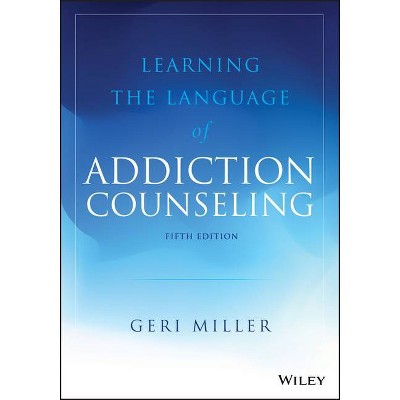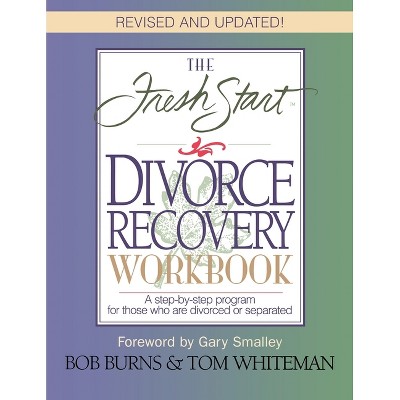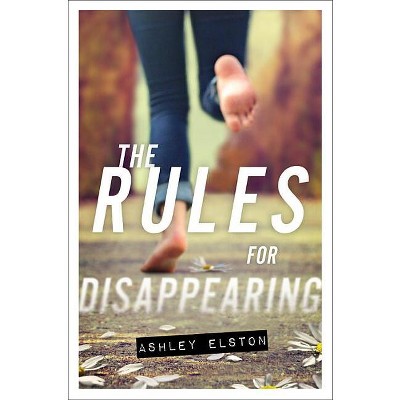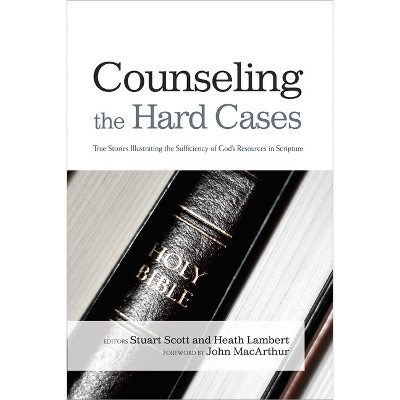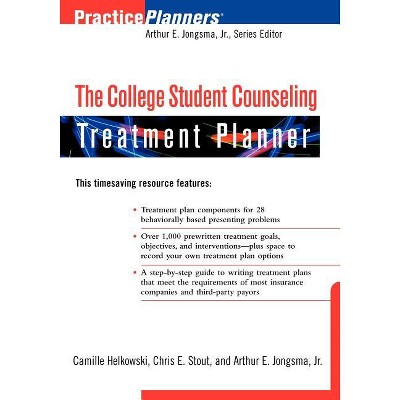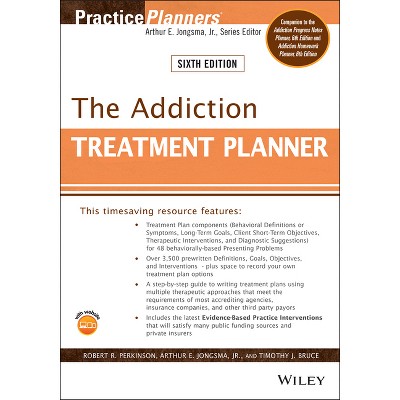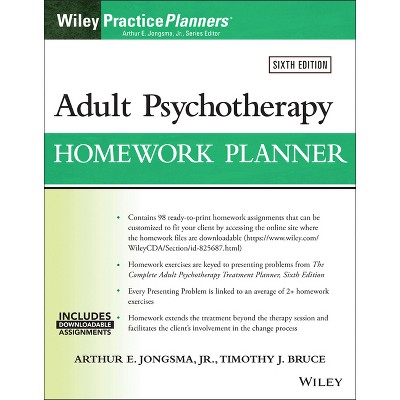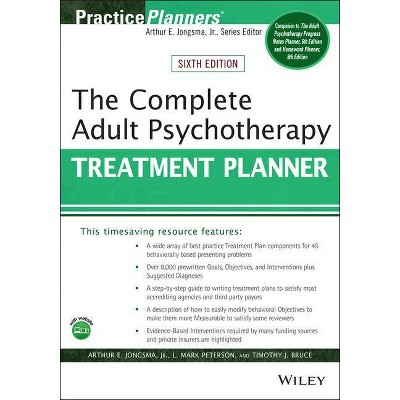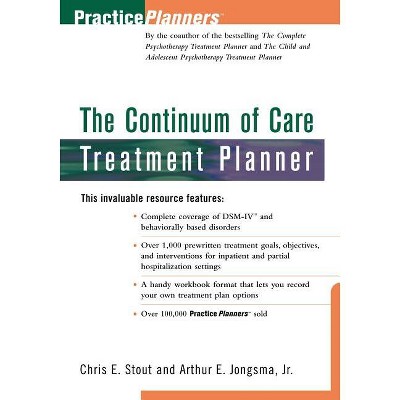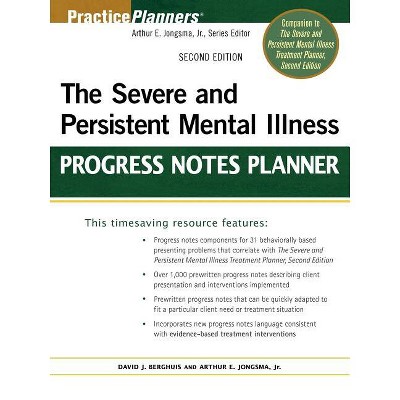Sponsored

The College Student Counseling Treatment Planner - (PracticePlanners) 2nd Edition by Chris E Stout & Timothy J Bruce & Arthur E Jongsma (Paperback)
In Stock
Sponsored
About this item
Highlights
- Guide to develop formal treatment plans for third-party payers and state and federal review agencies Pressure from accrediting agencies and other outside parties has increased the need for clinicians to produce effective, high-quality treatment plans; Treatment Planners provide all the elements necessary to quickly and easily develop formal treatment plans that satisfy the needs of most third-party payers and state and federal review agencies.
- About the Author: CHRIS E. STOUT, PSYD, MBA, is a licensed clinical psychologist and Founding Director of the Center for Global Initiatives.
- 592 Pages
- Psychology, Psychotherapy
- Series Name: PracticePlanners
Description
About the Book
"This valuable resource offers clinicians a timesaving, evidence-based guide that helps to clarify, simplify and accelerate the treatment planning process so they can spend less time on paperwork and more time with clients. The authors provide all the elements necessary to quickly and easily develop formal, customizable treatment plans that satisfy the demands of HMOs, managed-care companies, third-party payers and state and federal agencies"-- Provided by publisher.Book Synopsis
Guide to develop formal treatment plans for third-party payers and state and federal review agencies
Pressure from accrediting agencies and other outside parties has increased the need for clinicians to produce effective, high-quality treatment plans; Treatment Planners provide all the elements necessary to quickly and easily develop formal treatment plans that satisfy the needs of most third-party payers and state and federal review agencies. This second edition has been updated with new chapters and appendices, and enables readers to stimulate clinical thought to improve the quality and comprehensiveness of treatment plans, and to reduce the time involved in recordkeeping.
In this new edition, readers will find:
- New chapters on Anxiety, Attention-Deficit/Hyperactivity Disorder, Bipolar Disorder, Low Self-Esteem, Obsessive-Compulsive and related Disorders, Opioid Use Disorder, Panic Disorder/Agoraphobia, Sexual Promiscuity, Sleep Disturbance, Social Anxiety, and Specific Phobia
- New Objectives and Interventions consistent with identified evidence-based practices
- Integrated DSM-5 diagnostic labels and codes into the Diagnostic Suggestions section of each chapter
- More suggested homework assignments integrated into the Interventions
Treatment Planners help practitioners clarify, simplify, and accelerate the treatment planning process, so they spend less time on paperwork and more time with their clients.
From the Back Cover
An indispensable, time-saving resource enabling psychotherapy providers to easily create and submit high-quality, formal treatment plans
Pressure from accrediting agencies and other outside parties has increased the need for clinicians to produce effective, high-quality treatment plans; Treatment Planners provide all the elements necessary to quickly and easily develop formal treatment plans that satisfy the needs of most third-party payers and state and federal review agencies. This second edition has been updated with new chapters and appendices, stimulates clinical thought to improve the quality and comprehensiveness of treatment plans, and reduces the time involved in recordkeeping.
In this new edition, readers will find:
- New chapters on Anxiety, Attention-Deficit/Hyperactivity Disorder, Bipolar Disorder (Depression and Mania), Childhood Trauma, Low Self-Esteem, Self-Harm, Sexual Abuse Victim, Sexual Orientation Confusion, Sexual Promiscuity, Sleep Disturbance, Social Anxiety, Specific Phobia, and Substance Use.
- New Objectives and Interventions consistent with identified evidence-based practices
- Updated DSM-5-TR diagnostic labels and codes in the Diagnostic Suggestions section of each chapter
- More suggested homework assignments integrated into the Interventions
Treatment Planners help practitioners clarify, simplify, and accelerate the treatment planning process, so they spend less time on paperwork and more time with their clients.
About the Author
CHRIS E. STOUT, PSYD, MBA, is a licensed clinical psychologist and Founding Director of the Center for Global Initiatives. He served as the first Chief of Psychology for the State of Illinois, President of the Illinois Psychological Association, is a Life Member of the American Psychological Association and Fellow in three Divisions. He was formerly a Clinical Full Professor in the College of Medicine, University of Illinois, Chicago, and on the faculty of Northwestern University's Feinberg School of Medicine.
TIMOTHY J. BRUCE, PH.D, is Professor emeritus of the Department of Psychiatry and Behavioral Medicine at the University of Illinois College of Medicine.
ARTHUR E. JONGSMA, JR., PH.D, created the bestselling PracticePlanners series. He has provided professional mental health services to both inpatient and outpatient clients for approximately 50 years. He was the Founder and Director of Psychological Consultants, a group private practice in Michigan, for 25 years.
Shipping details
Return details
Frequently bought together


Trending Non-Fiction






